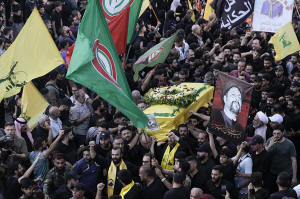Former Israeli spies describe attack using exploding electronic devices
against Hezbollah
 Send a link to a friend
Send a link to a friend
 [December 23, 2024]
By DARLENE SUPERVILLE [December 23, 2024]
By DARLENE SUPERVILLE
WASHINGTON (AP) — Two recently retired senior Israeli intelligence
agents shared new details about a deadly clandestine operation years in
the making that targeted Hezbollah militants in Lebanon and Syria using
exploding pagers and walkie talkies three months ago.
Hezbollah began striking Israel almost immediately after Hamas’ Oct. 7,
2023, attack that sparked the Israel-Hamas war.
The agents spoke with CBS “60 Minutes” in a segment aired Sunday night.
They wore masks and spoke with altered voices to hide their identities.
One agent said the operation started 10 years ago using walkie-talkies
laden with hidden explosives, which Hezbollah didn't realize it was
buying from Israel, its enemy. The walkie-talkies were not detonated
until September, a day after booby-trapped pagers were set off.
“We created a pretend world,” said the officer, who went by the name
“Michael.”
Phase two of the plan, using the booby-trapped pagers, kicked in in 2022
after Israel's Mossad intelligence agency learned Hezbollah had been
buying pagers from a Taiwan-based company, the second officer said.
The pagers had to be made slightly larger to accommodate the explosives
hidden inside. They were tested on dummies multiple times to find the
right amount of explosive that would hurt only the Hezbollah fighter and
not anyone else in close proximity.

Mossad also tested numerous ring tones to find one that sounded urgent
enough to make someone pull the pager out of their pocket.
The second agent, who went by the name “Gabriel,” said it took two weeks
to convince Hezbollah to switch to the heftier pager, in part by using
false ads on YouTube promoting the devices as dustproof, waterproof,
providing a long battery life and more.
He described the use of shell companies, including one based in Hungary,
to dupe the Taiwanese firm, Gold Apollo, into unknowingly partnering
with the Mossad.
Hezbollah also was unaware it was working with Israel.
Gabriel compared the ruse to a 1998 psychological film about a man who
has no clue that he is living in a false world and his family and
friends are actors paid to keep up the illusion.
[to top of second column]
|

Hezbollah fighters carry one of the coffins of four fallen comrades
who were killed Tuesday after their handheld pagers exploded, during
their funeral procession in the southern suburb of Beirut, Lebanon,
Wednesday, Sept. 18, 2024. (AP Photo/Bilal Hussein, File)

“When they are buying from us, they have zero clue that they are
buying from the Mossad,” Gabriel said. “We make like ‘Truman Show,’
everything is controlled by us behind the scene. In their
experience, everything is normal. Everything was 100% kosher
including businessman, marketing, engineers, showroom, everything.”
By September, Hezbollah militants had 5,000 pagers in their pockets.
Israel triggered the attack on Sept. 17, when pagers all over
Lebanon started beeping. The devices would explode even if the
person failed to push the buttons to read an incoming encrypted
message.
The next day, Mossad activated the walkie-talkies, some of which
exploded at funerals for some of the approximately 30 people who
were killed in the pager attacks.
Gabriel said the goal was more about sending a message than actually
killing Hezbollah fighters.
“If he just dead, so he’s dead. But if he’s wounded, you have to
take him to the hospital, take care of him. You need to invest money
and efforts,” he said. “And those people without hands and eyes are
living proof, walking in Lebanon, of ‘don’t mess with us.’ They are
walking proof of our superiority all around the Middle East.”
In the days after the attack, Israel's air force hit targets across
Lebanon, killing thousands. Hezbollah's leader, Hassan Nasrallah,
was assassinated when Israel dropped bombs on his bunker.
By November, the war between Israel and Hezbollah, a byproduct of
the deadly attack by Hamas militants in southern Israel on Oct. 7,
2023, ended with a ceasefire. More than 45,000 Palestinians have
been killed in the war in Gaza between Israel and Hamas militants,
health officials have said.
The agent using the name “Michael” said that the day after the pager
explosions, people in Lebanon were afraid to turn on their air
conditioners out of fear that they would explode, too.
“There is real fear,” he said.
Asked if that was intentional, he said, “We want them to feel
vulnerable, which they are. We can’t use the pagers again because we
already did that. We’ve already moved on to the next thing. And
they’ll have to keep on trying to guess what the next thing is.”
All contents © copyright 2024 Associated Press. All rights reserved |